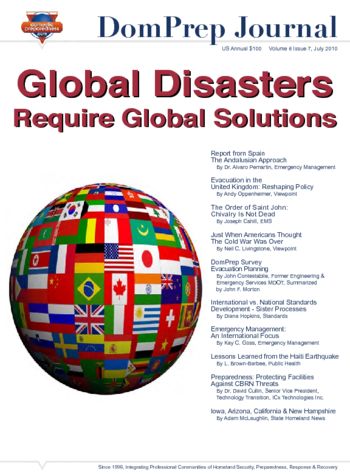

Evacuation in the United Kingdom: Reshaping Policy
Andy Oppenheimer
July 28, 2010
The “9/11” attacks on the World Trade Center Towers in New York City differed in several respects from the “7/7” bombings of the London transit system. But both of these mass-casualty disasters led to the belated public recognition of terrorism as a clear and present danger – and, from there, a much-needed reordering of U.S./U.K. homeland-defense practices and priorities.

Emergency Management: An International Focus
Kay C. Goss
July 28, 2010
The International Association of Emergency Managers provides a golden example by demonstrating how global-outreach programs can benefit all members of a specific professional community – and, not incidentally, the varied publics they serve. Here is a must-read insider’s report from a recognized U.S. expert.

International vs. National Standards Development – Sister Processes
Diana Hopkins
July 21, 2010
From the glory days of the Roman empire to the space age the mandatory width of a public road had to be “enough to accommodate two horses pulling a chariot and trotting side by side” – or so the story goes. Today, the setting of minimum widths, sizes, etc. – plus numerous qualitative intangibles – is much more complex, but also much more important.

Preparedness: Protecting Facilities Against CBRN Threats
David W. Cullin
July 21, 2010
“The year 2013” is the best-guess estimate of a high-level government commission of when the United States “can expect a terrorist attack…[involving] nuclear or biological materials.” Which means there is very little time left to prepare for Armageddon. A senior corporate executive and highly respected scientist offers his views on what must be done to avert a massive global disaster.

Lessons Learned from the Haiti Earthquake
L. Browne-Barbee
July 21, 2010
From the Last Days of Pompeii to the present, great nations and individual citizens have been striving to cope with random acts of nature. In one sense, this striving represents an almost hopeless quest for perfection. But in a larger sense the lessons learned, and the lives saved, not only make the effort worthwhile for today’s world but also serve as a beacon of hope for the future.

Just When Americans Thought the Cold War Was Over
Neil C. Livingstone
July 21, 2010
To many Americans the well publicized apprehension of 10 Russian spies seemed to be a throwback to
the Cold War – except for the amateurish bumbling and fumbling involved, which changed a potentially
damaging international incident into a quasi-comedy. But the situation was not as funny as it seemed,
and should be viewed as a helpful warning that the United States is still far too vulnerable not only to
espionage but also to deliberate attacks by true professionals.

The Order of Saint John: Chivalry Is Not Dead
Joseph Cahill
July 14, 2010
Emergency Medical Services (EMS) agencies are a microcosm of medicine throughout the world. Although there is some variation in the details, EMS units in all industrialized countries are much the same as in the United States. The main variation is the nature of the staff providing care – i.e., some systems provide advanced care using responders such as paramedics, while others have physicians who respond to the scene of an accident or incident.

REPORT FROM SPAIN: The Andalusian Approach
Alvaro Pemartin
July 14, 2010
“To each his own” – four little words with a host of different meanings, depending on the circumstances, but understood (and sometimes even followed) in every nation of the world. Another warning to the wise: “When in Rome, do as the Romans do.” And, it says here, “When in Andalusia (and in need of medical help), do as the Andalusians do.”

DomPrep Survey: Evacuation Planning
Domestic Preparedness
July 14, 2010
Drenching rain, incredibly high winds, and bumper-to-bumper 30-mile traffic jams. The first two are
unavoidable when a hurricane strikes; but the traffic, and frustration, can be eased considerably if an
effective evacuation plan is in place. Please: TAKE THE SURVEY NOW.

